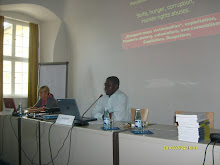The decision by the MDC National Council to join the GNU as stated by the SADC communique has opened a new chapter in the history of Zimbabwe. As we begin the necessary journey to restoration of our beloved country, we are all called to action. This is so important that we all should play a part, if not for orselves then for succeeding generations. Economists are working flat out on how our economy can be revived. Medical doctors are thinking of how our health system can be reconstructed. Everyone should be thinking about they can make a difference in their own fields for the common good. I have been thinking and am still thinking about how I can make a contribution of my own. Its clear to me that as life continued to deteriorate in Zimbabwe, we have been demonstrating our religiosity. Everywhere you go, people always look at their faith communities as their refuges. Despite this centrality of religion in our lives, we happen to have relegated religion to the level of mystery through and through. I hope as we discuss these things, we will learn more about how religion remains one of the most subtle influences in our lives. Unless we seriously, critically and deliberately seek to understand religion and how as in our recent past, religion becomes entangled with politics of domination, we may find ourselves returning to where we are coming from.
Today's talking point for me is connected to the drafting of a new democratic constitution. The last time a new constitution was attempted, there were moves by some Christian denominations and organisations that were pushing for Zimbabwe to be declared a Christian Nation. I hope this kind of selfishness on the part of Christians must never be entertained because fundamentally Zimbabwe is a multi-faith nation. No one religion should seek to gain unfair advantage over other religions on the strength of their being the dominant group. The new constitution must not only uphold the freedom of religion but must effectively define the principle of the separation of state and religion. Religious beliefs are essentially private beliefs and belong to voluntary organisations, they should never be used as the basis of public law in a nation that has different religious beliefs and practices. No single religion must gain an unfair advantage over other religions in the new democratic constitution. The constitution must address the citizens of the whole country and must avoid cases of clear transplantation of religious injunctions as public policy or law.
This is my position on the new constitution. What is your contribution? Join the debate!
Friday, January 30, 2009
Subscribe to:
Posts (Atom)
